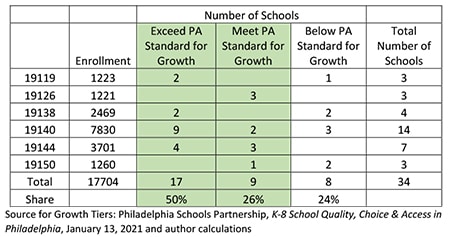Comments on the New 2020-21 New Charter Application for the Proposed Philadelphia Collegiate School for Boys
ML Wernecke
Director, PA Charter Performance Center
Public Citizens for Children and Youth
January 29, 2021
My name is ML Wernecke and I am the Director of the PA Charter Performance Center, a new initiative of Public Citizens for Children and Youth. The Center is dedicated to producing unbiased, accurate, and timely information to advance sound state-level charter school policy
and I thank you for the opportunity to comment on the application for the proposed Philadelphia Collegiate School for Boys. My comments fall into three areas.
First, the application does not sufficiently demonstrate that the Philadelphia Collegiate School for Boys will provide comprehensive learning experiences to students or that its programs will enable students to meet the academic standards under 22 Pa. Code Chapter 4.
The applicant has operated the Baltimore Collegiate School for Boys (BCSB) since 2015 with a current enrollment of 477 students in grades 4 to 8. The applicant is seeking a charter for a K-12 school in Philadelphia with 1,268 seats (K-8 with 740 seats in the first five years). At scale, the Philadelphia school would be over 2.5 times larger than the existing school in Baltimore.
The applicant’s vision of a much larger school in Philadelphia is concerning in light of the BCSB performance on academic and growth measures. According to the Maryland State Department of Education (MSDE), BCSB earned 73.3 out of 176.5 total points on overall school performance which, in comparison to other schools, gives it a two-star rating out of five and a percentile rank of 4 (for Elementary) and 19 (for Middle). In fairness, it is laudable that 98% of BCSB’s elementary and middle school students were not chronically absent. However, students at both levels underperformed in reading and math despite strong attendance. MSDE’s 2018-19 BCSB School Report Card is attached to these comments.
The best predictor of future performance in Philadelphia is BCSB’s current performance in Baltimore. Based on the MSDE data, it appears unlikely that the applicant would be able to achieve the academic goals outlined in the proposal, especially given that they are proposing
opening a much larger school in a new city on a tight timeline.
Second, the proposed school risks destabilizing established schools that are already demonstrating high academic growth.
The applicant states that it is currently recruiting students in six zip codes: 19119, 19126, 19138, 19140, 19144, and 19150. As shown below, 17,704 students attend 34 charter and traditional public schools in these neighborhoods. Adding new seats at a new school will inevitably reduce enrollment at existing public schools, destabilizing schools that are making progress.
Pennsylvania’s PVAAS growth measures are reliable and validated indicators of improved school performance. PVAAS uses PSSA test results to gauge student academic growth and assess whether schools are making more progress than other schools in the commonwealth. As the
table below shows, three out of four of the schools (76%) in this applicant’s recruitment zone are at or above the norm for the state. This means students in these schools are progressing at or more than would be expected based on statewide trends. Authorizing new schools at the expense of schools that are already making progress does not support the goal of enabling students to meet academic standards.
Finally, the applicant lacks strong local leadership and sustainable support.
Note: Appendices to the application are not posted on the Charter School Office website, complicating efforts to evaluate leadership qualifications. PCCY has previously requested that appendices be posted on the website and we respectfully renew this request.
Based on the summaries in the narrative, it appears that only two of eight founding members (Sellers and Justice) and one of five board members (Spain) reside or have significant work experience in Philadelphia. None of these individuals appear to have an educational background. The lack of local connections and experience will complicate efforts to bring up a new school, especially when problems arise. For example, the application describes how BCSB was required to move three times in it first five years. While this is an accomplishment, it would be more difficult to achieve outside of their hometown of Baltimore and raises the question of whether the applicant has demonstrated sufficient sustainable support.
If the Board of Education chooses to authorize new seats in any new charter schools, we urge you to do so in a manner that will not result in a net increase in total charter school seats as this would negatively affect the availability of funding to educate students attending schools operated directly by the District.
Thank you for the opportunity to add this statement to the record.

